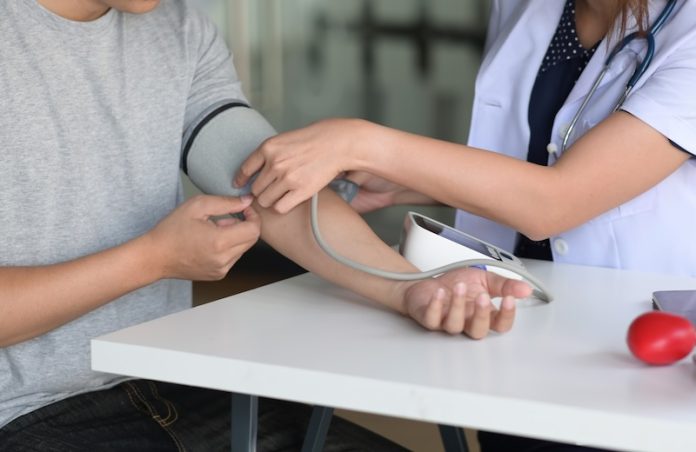
Researchers have been investigating a common medication that doctors prescribe for people with high blood pressure, and they’ve discovered some interesting things about it.
This pill is called chlorthalidone, and while it’s often used to keep blood pressure in check, it might also cause a few problems.
But don’t worry — doctors are looking into it, and there’s no need to panic. Let’s dive into what they’ve found and what it means.
What Is High Blood Pressure?
Before we get into the study, it helps to understand what high blood pressure is. Think of your blood as cars driving on a highway. When those cars are going too fast, they could cause accidents.
In the same way, when your blood moves too forcefully through your blood vessels, it puts extra pressure on the walls, which can lead to health problems. High blood pressure, also known as hypertension, can increase the risk of heart attacks, strokes, and even damage to your kidneys.
Luckily, doctors have many ways to help manage high blood pressure. Medications and healthy lifestyle changes, like eating well and exercising, are common treatments.
What Did the Study Discover?
In this study, researchers at Columbia University looked at data from over 730,000 people who had been taking blood pressure medication for 17 years.
They wanted to compare two common drugs used for treating high blood pressure: chlorthalidone and another one called hydrochlorothiazide. Both medications work well to prevent heart attacks and strokes, but there were some differences in their side effects.
Here’s the key finding: people taking chlorthalidone were three times more likely to develop a condition called hypokalemia, which means having very low levels of potassium in their blood. Potassium is a vital mineral that our bodies need to function properly, especially for muscles and the heart.
Why Is Potassium Important?
Potassium plays an essential role in keeping our muscles and nerves working. It’s also important for maintaining a healthy heartbeat. When potassium levels drop too low, it can cause a person to feel weak, tired, or even have heart problems.
In the study, about 6.3% of people taking chlorthalidone had low potassium levels, compared to only 1.9% of those on hydrochlorothiazide.
Other Concerns
Low potassium wasn’t the only issue linked to chlorthalidone. People taking this drug also faced a higher risk of problems with their electrolytes — chemicals in the body that are important for keeping everything working smoothly, from muscles to heartbeats.
In addition, people taking chlorthalidone were more likely to develop kidney problems. Since kidneys are responsible for filtering waste from the blood, any issues with kidney function can be a big concern.
What Does This Mean for Patients?
These findings don’t mean that everyone taking chlorthalidone will experience these side effects. However, it’s important for doctors to be aware of the risks so they can monitor their patients carefully.
Many doctors currently prefer chlorthalidone over hydrochlorothiazide because it’s generally effective at lowering blood pressure. But this study may cause some to rethink their approach and consider other options for their patients.
Keeping Blood Pressure Healthy
Even if you’re not taking chlorthalidone or any other blood pressure medication, there are still plenty of ways to keep your blood pressure in a healthy range. Here are some tips:
- Eat a healthy diet: Focus on eating fruits, vegetables, and whole grains. Try to avoid too much salt, as it can raise blood pressure.
- Exercise regularly: Physical activity can help lower blood pressure and improve overall heart health.
- Limit alcohol: Drinking too much alcohol can raise blood pressure, so it’s best to limit your intake.
- Quit smoking: Smoking increases your risk of heart disease and raises blood pressure, so stopping is a great step toward better health.
- Manage stress: Try relaxation techniques like meditation, yoga, or simply taking a walk. Reducing stress can make a big difference in keeping blood pressure under control.
What’s Next?
Researchers are continuing to study chlorthalidone and other medications to make sure they are safe and effective. In the meantime, if you or someone you know is taking chlorthalidone, there’s no need to be alarmed.
Just make sure to have regular check-ups with your doctor and share any concerns or changes in your health. Your doctor can help monitor your condition and decide if any adjustments to your treatment are needed.
In the end, the best way to keep your blood pressure healthy is by working closely with your healthcare provider, staying informed, and making heart-healthy choices. Keeping those “blood highways” running smoothly is key to living a longer, healthier life.
If you care about high blood pressure, please read studies about breakfast for better blood pressure management, and the gut feeling that lowers blood pressure.
For more health information, please see recent studies about how the dash diet helps lower blood pressure, and how to eat your way to healthy blood pressure.
Copyright © 2024 Knowridge Science Report. All rights reserved.



